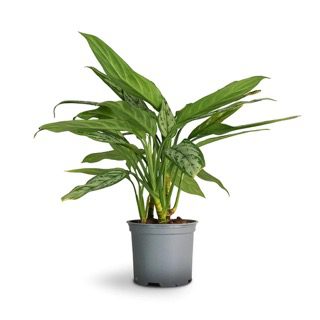
The Chinese evergreen (Aglaonema) plant is toxic to dogs if ingested. The plant contains calcium oxalate crystals, which can cause vomiting, drooling, difficulty swallowing, and oral irritation if consumed by dogs. Therefore, these plants pose a risk to dogs, and precautions should be taken to ensure dogs cannot eat them. It is better to keep these plants away from dogs to avoid any potential danger. If dogs consume these plants, the effects they may experience include oral irritation, vomiting, decreased appetite, and diarrhea. If your dog eats this plant, it is recommended to contact a veterinarian immediately to seek medical attention. As a veterinarian, I advise dog owners to be cautious when selecting indoor plants and ensure they can be safely around dogs.
The Chinese evergreen is a common houseplant with attractive foliage that is easy to care for. It prefers warm and humid environments and is widely used in both indoor and outdoor settings, including homes and public spaces. The plant is popular for its air-purifying qualities and variety of colorful foliage patterns.
Common symptoms of dogs poisoning from the Chinese evergreen plant include vomiting, drooling, difficulty swallowing, and oral irritation. Behavioral changes may include decreased appetite and diarrhea. Physical symptoms and visible signs of toxicity may include oral irritation and discomfort. If your dog has been exposed to this plant, immediate actions to take include contacting a veterinarian and seeking medical attention. To prevent dogs from eating this plant, keep it out of their reach and avoid placing it in areas accessible to them. If your dog eats this plant, contact your veterinarian immediately for medical advice. This applies to any part of the plant, including leaves, roots, and other parts. As a precaution, it is advisable to be careful when selecting indoor plants to ensure that they are safe for dogs.
Do you have a Chinese evergreen (Aglaonema) plant in your home or are you thinking about getting one? Be aware that this plant is toxic to dogs if ingested, and precautions should be taken to prevent this from happening. To make sure that the house plants you have or plan to have at home are safe options for your furry friend, check out our website Way Canina. You can compare different house plants and their potential risks to dogs, as well as finding out which plants are the best options for your canine companion.
There are many safe and non-toxic indoor plants that are suitable for dog owners. Some examples include spider plants, bamboo palm, Boston fern, orchids, and African violets. These plants not only add beauty and greenery to your indoor space but also provide health benefits by purifying the air.
When it comes to outdoor plants, it is essential to choose plants that pose minimal risks to dogs. Some dog-safe options include marigolds, snapdragons, sunflowers, and petunias. It is also important to avoid planting toxic plants such as lilies, tulips, azaleas, and daffodils in your yard. Another landscaping tip is to create a designated dog area in your yard where your furry friends can play and explore safely without encountering any toxic plants or other potential hazards.
In summary, as a dog owner, it is crucial to be aware of the plants in your home and yard that can be hazardous to your pet’s health. By choosing safe and non-toxic indoor plants and landscaping your yard with dog-friendly plants, you can create a happy and healthy environment for your furry friend.
Thank you for reading our article on the toxicity of Chinese evergreen plants for dogs. As always, our goal at Way Canina is to provide you with important information and tips to keep your furry friends healthy and safe. Remember to always be alert and cautious when selecting indoor plants that are safe for your pets. We hope you visit our site again soon for more healthy food ideas and lifestyle information for your dogs, even if you don’t have the mentioned houseplant. Keep your pups safe and have a great day!
The Chinese evergreen is a popular houseplant known for its ease of care and attractive foliage. It is native to tropical and subtropical regions of Asia, and has been cultivated for ornamental purposes for centuries. The plant is also known by other common names such as silver queen, emerald beauty, and striped umbrella plant.
Chinese evergreens are suitable for both indoor and outdoor use, although they are primarily used as houseplants due to their preference for warm and humid environments. They are commonly used in offices, homes, and public spaces as decorative elements, and are known for their air-purifying qualities.
The plant is most popular in regions with mild to warm climates, such as the southeastern United States. However, it can be grown in a variety of climatic conditions, as long as it is kept away from extreme temperatures and direct sunlight.
People choose the Chinese evergreen as a houseplant because it is low-maintenance, making it ideal for novice gardeners or those with busy schedules. The plant is also known for its attractive foliage, which can come in a variety of vibrant colors and patterns, making it a popular choice for adding a touch of greenery to any space.